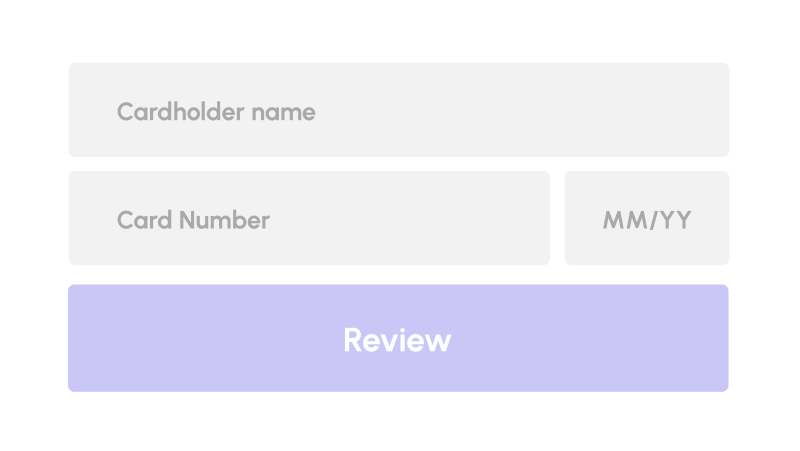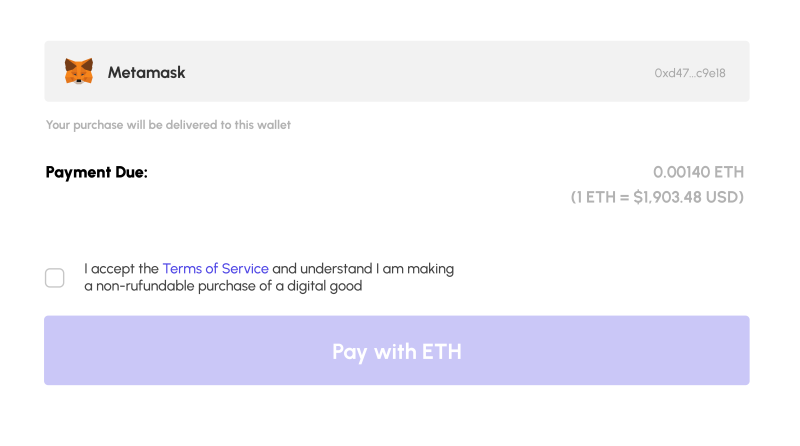CheckoutWithCard element is an embeddable iframe that allows your buyers to purchase your NFT with credit card.

“Enter card information” page

“Review your purchase” page
The native Javascript offers you three composable pieces to create the CheckoutWithCard element:
- createCheckoutWithCard
- createCheckoutWithCardLink
- createCheckoutWithCardMessageHandler
If you’re looking to use the native JS SDK and get started as soon as possible, you’ll start with the createCheckoutWithCard which uses both createCheckoutWithCardLink and createCheckoutWithCardMessageHandler under the hood to create the CheckoutWithCard element.
createCheckoutWithCard
Code Snippet
import { createCheckoutWithCardElement, } from '@nftgate/js-client-sdk'; // Assuming a container exists:createCheckoutWithCardElement({ sdkClientSecret, elementOrId: 'nftgate-checkout', appName, options, onLoad() {}, onError(error) { console.log("error", error); }, onPaymentSuccess({ id }) { console.log("transactionId", id); }, onOpenKycModal({ iframeLink }) { // You should open the iframeLink in an iframe embedded in a modal of your choice console.log("iframeLink", iframeLink); }, onCloseKycModal: () => { // you can close the modal that was opened from the KYC previously here console.log("close kyc modal"); }, onReview({ cardholderName, id }) { console.log("cardholderName, id", cardholderName, id); }, }); // Alternatively, insert the iframe programmatically: // const iframe = createCheckoutWithCardElement(...) // document.getElementById('nftgate-checkout').appendChild(iframe);
Props
| Props | Type | Description |
|---|---|---|
| sdkClientSecret * | string | The client secret returned from the Checkout SDK intent API. |
| onOpenKycModal * | (props: { iframeLink: string }) => void | This callback provides a link which developers must load in an iframe to complete the purchase.Failing to do so would mean that the buyer’s purchase will not complete. |
| onCloseKycModal * | () => void | This callback allows you to close the iframe that was previously displaying the KYC details. |
| elementOrId | string | HTMLElement | If provided, the iframe will be appended this element.
Note that you can either pass in a reference to the containing element or the id associated with the containing element |
| appName | string | If provided, the wallet card will display your If provided, the wallet card will display your appName. |
| option | ICustomizationOptions | See Customizing Checkout Elements. |
| onLoad | () => void | This callback will be called when the iframe loads. |
| onError | (error: (error: [NFTgateSDKError](ref:nftgatesdkerror)) => void |
This callback will be called when an error occurs during the payment process. |
| onPaymentSuccess | (props : { id: string }) => void) | This callback will be called when the buyer has successfully paid. |
| onReview | (props: { cardholderName: string, id: string }) => void | This callback will be called after the user enters their card details. |
createCheckoutWithCardLink
This is the core building block that builds up the iframe link required to display the CheckoutWithCard element.
Once you generate the link, you can proceed to display it in an iframe but you’d still need to listen for a couple of events on the document in order to know when a payment is successful or when the user has to KYC. We provide a handler which does most of the heavy lifting.
Code Snippet
const checkoutWithCardUrl = createCheckoutWithCardLink({
sdkClientSecret,
appName,
options,
});Props
| Props | Type | Description |
|---|---|---|
| sdkClientSecret * | string | The client secret you get from create checkout SDK intent |
| appName | string | If provided, the wallet card will display your appName. |
| options | ICustomizationOptions | See Customizing Checkout Elements. |
createCheckoutWithCardMessageHandler
This is the message handler that is to be registered.
Essentially, this listens to six main events:
- checkoutWithCardError
- paymentSuccess
- reviewComplete
- openModalWithUrl
- completedSDKModal
- sizing
Code Snippet
const iframe = document.createElement("iframe");
window.addEventListener(
"message",
createCheckoutWithCardMessageHandler({
iframe,
onCloseKycModal,
onOpenKycModal,
onError,
onPaymentSuccess,
onReview,
})
);Props
| Props | Type | Description |
|---|---|---|
| iframe * | HTMLIFrameElement | The iframe that is displaying the link from createCheckoutWithCardLink |
| onOpenKycModal * | (props: { iframeLink: string }) => void | This callback provides a link which developers must load in an iframe to complete the purchase. Failing to do so would mean that the buyer’s purchase will not complete. |
| onCloseKycModal * | () => void | This callback allows you to close the iframe that was previously displaying the KYC details. |
| onError | (error: [NFTgateSDKError](ref:nftgatesdkerror)) => void | If provided, the callback will be called when anything wrong happens during the payment process. |
| onPaymentSuccess | (props : { id: string }) => void) | If provided, the callback will be called when the buyer has successfully paid. |
| onReview | (props: { cardholderName: string, id: string }) => void | If provided, the callback will be called when the user clicks the button after the enter their card details. |
Writing your own handler
You can write your own handler if you wish, Here’s how:
The event object that is passed by default into the message event contains the data filed which has the following type
type event.data = {
eventType: 'checkoutWithCardError',
code: NFTgateSDKErrorCode,
error: Error
} | {
eventType: 'paymentSuccess',
id: string
} | {
eventType: 'reviewComplete',
id: string,
cardholderName: string
} | {
eventType: 'openModalWithUrl',
iframeLink: string,
} | {
eventType: 'completedSDKModal'
} | {
eventType: 'sizing'
height: string,
width: string,
}You simply create a function that handles or ignores either of the two events, exactly the way you want:
window.addEventListener('message', (event: MessageEvent) => {
// we use this alternate domain to avoid certain firewalls blocking .xyz domains
if (!event.origin.startsWith("https://nftgatecheckout.com")) {
return;
}
const data = event.data;
switch(data.eventType): {
case "checkoutWithCardError": {
break;
}
case "paymentSuccess": {
break;
}
case "reviewComplete": {
break;
}
case "openModalWithUrl": {
break;
}
case "completedSDKModal": {
break;
}
case "sizing": {
break;
}
}
});